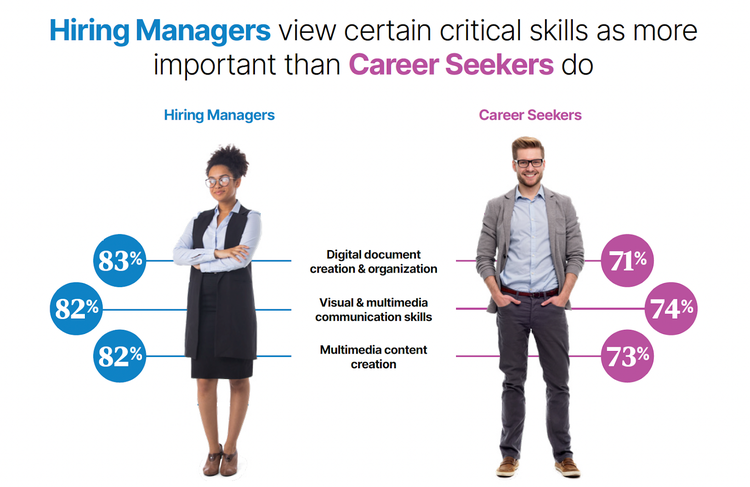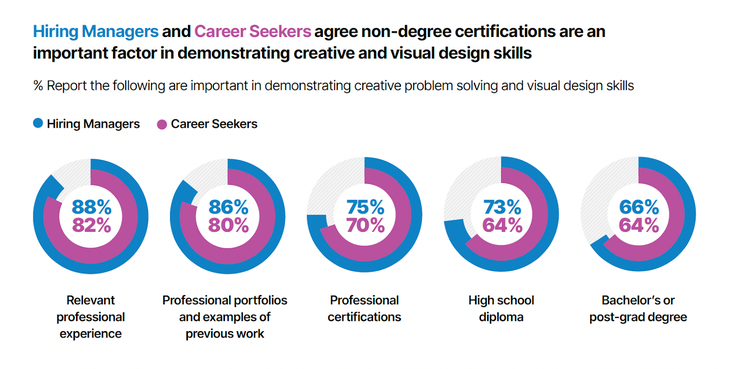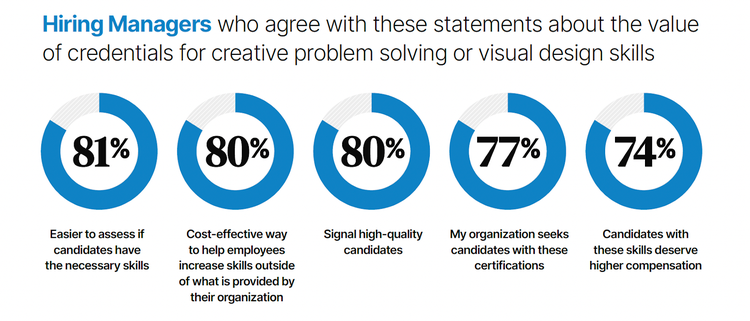How digital credentials unlock emerging skills in the age of AI

Gone are the days of a college degree being the only key to unlock meaningful careers. Employers today need job candidates and employees with new, in-demand skills, and they expect to see them demonstrated in a variety of ways beyond a college transcript. With the rise of remote work, digital transformation, and AI, today’s most in-demand skills — creative problem-solving, visual communication, and digital fluency — are especially hard for hiring managers to identify in job application materials.
To shed light on this evolving landscape, Adobe has just released a research white paper, “The Creative Edge: How Digital Credentials Unlock Emerging Skills in the Age of AI.” Conducted by Edelman, the results of this commissioned global research study outline the role digital credentials play in helping career seekers get hired by showcasing their digital and creative skills.
The results underscore the importance of these sought-after skills and how essential it is for students, career seekers, campuses, hiring managers, and credential providers to harness and fully utilize digital credentials.
The new essential skills in the age of AI
Digital credentials have emerged as powerful tools that validate skills essential to success. Creative thinking is increasing in importance more rapidly than any other skill, partially due to the rise of AI. According to the World Economic Forum, creative thinking is the second most in-demand skill for employers globally — most likely because every organization needs people who can generate new and valuable ideas and find solutions to problems and opportunities. Credentialing is a way for career seekers to demonstrate this skill, and for hiring managers to quickly identify candidates who possess it.
In addition, “The Creative Edge” study unveiled which skills hiring managers and career seekers, including college students, view as most important.
The results show a general alignment between these groups on top skills, including digital documents, visual and multimedia communication, and content creation. However, career seekers underestimate the importance of these skills to hiring managers.

Hiring managers in this study shared their challenges in identifying these essential skills based on traditional job applications, resumes, and degrees. Similarly, job candidates face difficulties in effectively showcasing these essential skills. To bridge this divide, non-degree credentials have emerged as a way to support those entering or in the job market by offering certifications, micro-credentials, and digital badges in these key skill areas.
Digital credentials are highly valued signals of essential skills
Standing out from a crowd isn’t always easy. This new research found that obtaining and displaying credentials offer a clear way to stand out in a competitive job market, while also enabling employers to identify individuals who possess the essential skills necessary to drive their organizations forward, both in the face of current and future challenges.
Hiring managers and career seekers in this study viewed professional certifications as the third most important way to demonstrate creative and design skills — ranked as more important than a high school diploma or college degree. However, career seekers (including students) still slightly underestimate their importance relative to hiring managers.

Unsurprisingly, relevant real-world experience and examples of past work rank the highest for both hiring managers and career seekers. Concrete opportunities exist for campuses to help students bundle these experiences and prepare them for success, such as requiring students to become credentialed in relevant skills and to create portfolios of work coupled with internships or apprenticeships.
Companies are looking for self-motivated, lifelong learners that employers need more than ever
A key insight from the World Economic Forum’s 2023 Jobs Report pointed to the rise of skills required for a rapidly evolving and shifting workforce, driven in large part by AI innovation. In the list of top ten skills rising in importance between now and 2027, three relate to self-efficacy: “curiosity and lifelong learning” (ranked fourth), “resilience, flexibility, and agility” (ranked fifth), and “motivation and self-awareness” (ranked eighth).
An unexpected finding from “The Creative Edge” report was the degree to which hiring managers see these self-efficacy skills reflected in candidates who have achieved digital credentials. In comments and interviews, hiring managers noted that they view candidates who have made the effort to obtain digital credentials as self-motivated, ambitious, and dedicated. 53 percent of hiring managers in the study said that having a digital credential demonstrates a candidate is committed to professional development.
“Certifications [show me] they knew exactly what they wanted to do, maybe didn’t have funding for school or were inspired by course work. We value hard work, dedication, and someone who is aspiring for something. That can come across in an interview especially well when they have multiple credentials.”
— Hiring Manager, U.S., Software
Because of all the ways digital credentials can signal essential skills and lifelong learning potential, hiring managers are looking for them more than ever. Not only do they make it easier to assess talent, hiring managers also shared that employees with credentials bring additional value to the business, including cost-effectiveness in training, reskilling, or upskilling.
And 74 percent of hiring managers also agree that candidates with credentials deserve higher compensation, setting those candidates on trajectories for larger economic opportunities over the span of their careers. In short, when a job application with a digital credential lands in their inbox, hiring managers view that candidate as someone of high-quality, who is willing to go the extra mile, and deserves to be compensated accordingly.

The Path Forward
This research demonstrates how digital credentials have a multi-faceted impact. Not only can they enhance employee retention by facilitating up-skilling and re-skilling but they also elevate the likelihood of securing employment or career advancement, often leading to increased earning potential.
To provide paths to success, collaborations between universities, professional organizations, and industry leaders will not only enable career seekers to acquire skills that benefit their personal and professional growth but also equip employers with the talent needed to thrive in an ever-changing world.
- Job seekers and students: Explore and showcase digital credentials that align with the top essential skills required across jobs and industries.
- Campuses and Educators: Incorporate credentialing programs into your campus programming, curriculum, and career services to equip students with future-proof skills.
- Employers: Embrace digital credentials and use them to identify candidates with the skills your organization needs to build a flexible, adaptable workforce.
- Credential Providers: Partner with all stakeholders — campuses, students, career seekers, and employers — to offer the most in-demand credentials and ensure all have awareness and access to fully realize their value.
